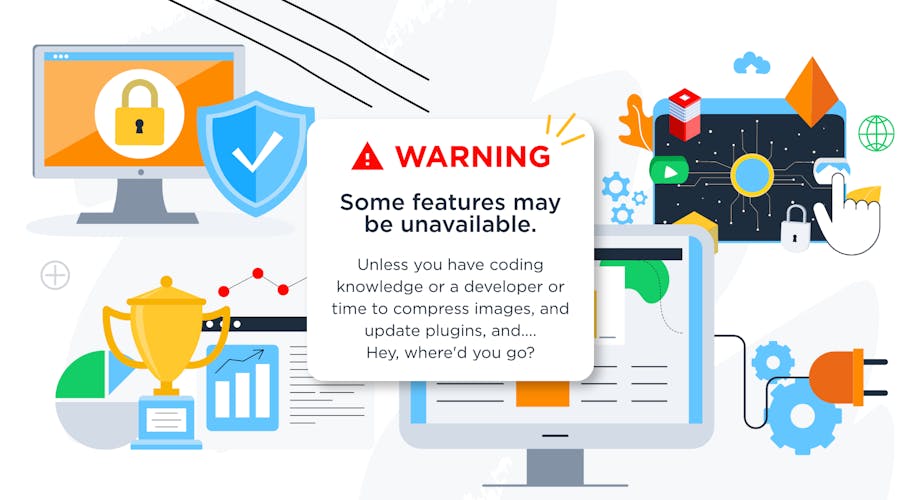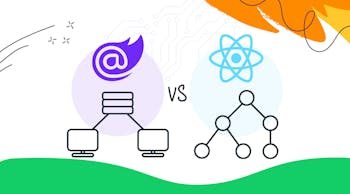While WordPress is the most popular Content Management System (CMS) in the world - powering around 40% of all websites in existence - there are some situations where it is not the best fit for a project. Instead, a bespoke solution might offer you the functionality you need; read on below to discover reasons why using WordPress as your CMS probably isn’t the best option.
1. Design Uniqueness
One of the major benefits of using a CMS like WordPress is the readily available templates that can be used to craft your website. Unfortunately, this also means that there are hundreds - if not thousands - of websites using your same template. While templates are certainly customizable, the extent of the customization will be limited to your coding knowledge and understanding of the WordPress backend.
If you’re looking for a website that truly stands out from the crowd, you’ll want a completely custom solution or partner with a WordPress design team that can take that original template and tailor-fit it for your needs.
2. Security Issues
One of the more well-known drawbacks to using WordPress is the potential security vulnerabilities this CMS can pose. Outdated core and plugins, lack of unique passwords, and no security hardening are all site elements that make WordPress a popular window of opportunity for hackers with malicious intent.
Obviously, not every WordPress site is hacked or has security issues, however, this is largely due to actions taken by the webmaster. Keeping your WordPress version up-to-date, updating your plugins, and monitoring your site record logs are some of the best ways you can keep your site protected. However, many site owners don’t have the time or desire to keep track of those pieces. If that sounds familiar, you may be better off with a custom solution that won’t require as many updates.
3. Website Performance
With the impending Core Web Vitals algorithm update, website performance and page speed have become more important than ever. Unfortunately, due to the way WordPress sites are built, they don’t typically pass those crucial page speed scores without extra help from a developer. Because WordPress isn’t innately built for speed, you will have to take the time to compress your images, use a CDN, and minimize external scripts.
While WordPress is continually making improvements to their core versions, at this time, a lot of those needed changes are still left to the site owner. Many of the suggestions given by page speed analysis tools are incredibly technical, making WordPress not as user-friendly as you may have originally thought
4. Plugin Support
While the intent behind plugins is to make your life easier and manage some of the tasks a webmaster would normally have to do manually, there can be major issues when the site is not looked at holistically. Each plugin is crafted by a different person or group of people and their skills are not necessarily vetted before the plugin is marketed and released. Additionally, plugins are not always compatible with each other - once again because they’re made by different people - this can quickly wreak havoc upon your site.
You may think adding a plugin is a quick solution to your site’s problem, but it actually may break your site and leave you vulnerable to the security issues we mentioned above. Also, if your site does break due to a plugin or that functionality you were promised wasn’t there, you may have a difficult time getting ahold of the plugin creator for support.
Don’t get us wrong, there are thousands of plugins that do their jobs effectively that we love, but it’s important to understand the risks associated with using them.
5. Customization Options
Most of the time the reason WordPress is not a good fit for a website project is that the webmaster or site owner is looking for a solution with more customization. Although WordPress customization options continue to improve, it is still a theme-based CMS, which limits any large overhauls you may want to do. In fact, even with extreme customization, your website may still look very similar to others online.
Besides aesthetic customization options, you may need your website to connect with a variety of third-party software, support your eCommerce efforts, or host your password-protected product, all of which may require functionalities outside the scope of WordPress.
Keep in mind that we work in WordPress all the time and there are many situations where WordPress is actually the best solution for a project. However, it is not the only CMS or site-building option available.
While we certainly hope this blog post clarified some of the reasons you may not want to build your site in WordPress, we’re happy to discuss your individual site’s needs. Contact Inventive for a quote today!









